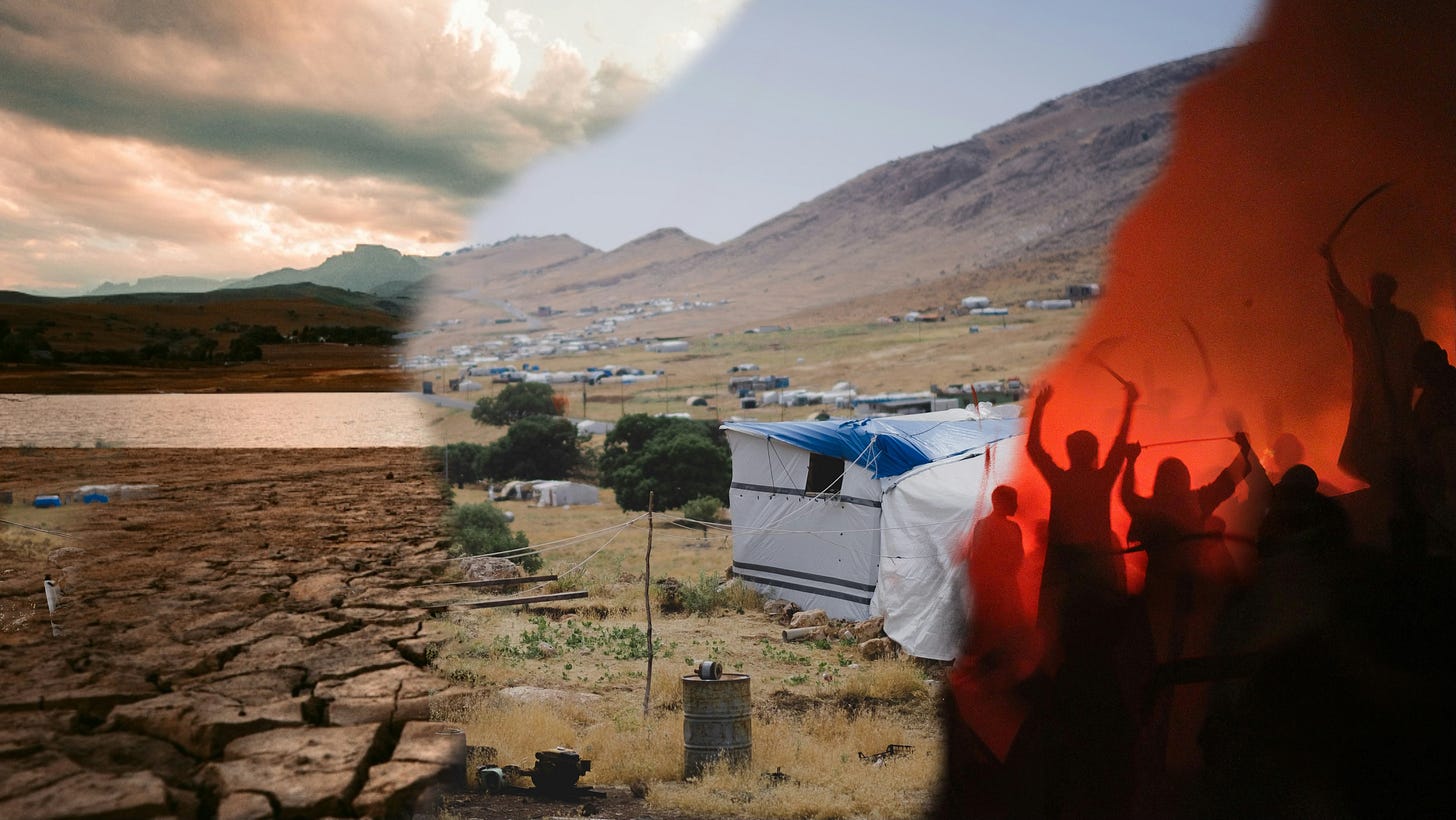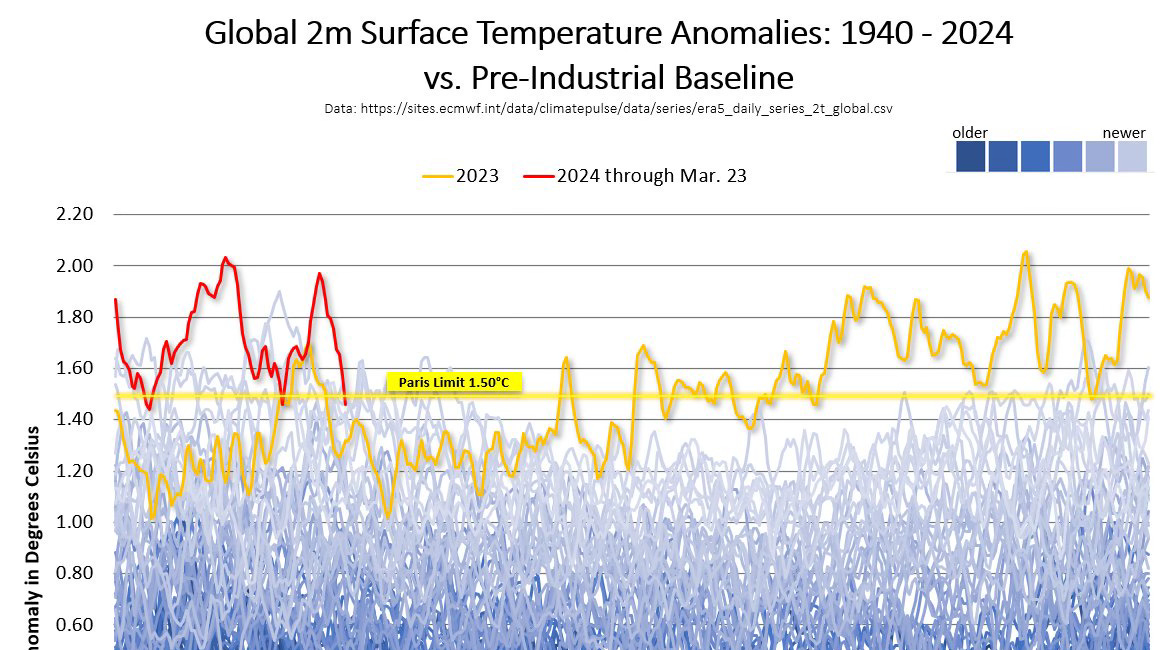In a World of Multiple Interconnected Crises, Risks Become More Complex
For many years, I've heard people deny the science behind global warming, arguing that throughout the history of our planet, the climate has always changed. Or they cherry-pick a convenient example, like a unique glacier growing, instead of the fact that the majority is shrinking.
Many outright deniers have changed their tune now that we have reached a level of climate change where you no longer need instruments to note the rapid changes all over the world. But it's still hard to convince everyone of the urgency of acting on the climate crisis by quoting anecdotal evidence, like reminding someone of their latest skiing trip, where they found green grass on the once snowy hills. Stories like these don't do justice to the global scale of the damage created by the climate crisis.
Instead, I have relied on Swiss Re's reports for many years to understand the global impact of climate change. As one of the world's largest reinsurance companies, Swiss Re offers reliable data and analysis on the effects of global warming.
Their insights into the annually increasing economic and insurance losses from climate change are unparalleled. While their data does not replace scientific conclusions, they reinforce them by providing measurable evidence of the harm climate change inflicts on life, property, and businesses. Their website on mitigating climate risk gives a good overview of the way the company works with their clients, partners, and governments to take actions to reduce the causes of climate risk and insure what cannot be mitigated.
Last week, Swiss Re published its annual SONAR report that promotes awareness about emerging risks and supports resilience-building efforts. This report navigates the intricate web of interconnected challenges, including the impacts of climate change, escalating international tensions, social dissatisfaction, and rising living costs.
A chain reaction of further instability
In an era where crises can amplify one another, there is a heightened risk of triggering a chain reaction of further instability, increased risks, and more significant potential losses for human lives and financial assets. This publication serves as a crucial guide in understanding, discussing, and addressing these multifaceted threats to make the world more resilient.
The SONAR report discusses 13 emerging risks and categorizes three as high risks. The evolving threat of climate change to international security is one of these high risks. It is a familiar theme for me that I have worked on for many years.
Climate change is a threat multiplier or a destabilizer rather than a direct cause of conflict. I have seen the journalistic use of phrases like 'climate wars' or 'water wars,' but single-cause conflicts are hard to find since the reality is usually a complex combination of factors. That is all the more reason to include climate change impacts in risk assessments since they manifest in many forms, extending beyond severe weather events to significantly affect global food security, water availability, and socio-economic stability.
In 2022, climate change exacerbated acute food insecurity for a quarter of a billion people in 58 countries, with 35 million facing starvation due to conflicts and extreme weather. Experts predict a fresh-water crisis, with demand exceeding supply by 40% by 2030, driven by misuse, pollution, and climate change-induced hydrological shifts.
Climate change to displace 216 million by 2050
The consequences of climate change are widespread, impacting business operations, financial markets, property, and life and health insurance sectors. Agricultural output loss leads to rural livelihood disruptions and mass migration, with the U.N. estimating that climate change could displace 216 million people within their countries by 2050. Seventy percent of the most climate-vulnerable countries are also socio-economically fragile, facing heightened risks of civil disorder due to food scarcity, resource competition, and migration pressures.
Climate change also poses threats to peace and security, fueling extremist organizations that exploit water scarcity to gain control and offer jobs to impoverished households. Rising temperatures correlate with increased crime and social tensions, as seen in the U.S., where online hate messages surge by 22% on warmer days. Additionally, melting Arctic ice opens new trade routes and resource access, sparking geopolitical tensions and potential military conflicts.
Assessing climate change risks is essential for global and national security and business continuity planning. Companies must evaluate potential disruptions from climate-related changes beyond the immediate physical risks to ensure resilience in an increasingly unstable environment.
I highlighted only one of the 13 emerging risks and three trend spotlights here. Thus, I recommend reading the Swiss Re SONAR report about new emerging risk insights and the Natural Catastrophes in the 2023 sigma report since both provide excellent analysis by a world leader in the reinsurance industry with unique insights and analysis of climate change-related risks. The reports fit in with the company's commitment, which extends beyond insurance, aiming to empower progress and resilience worldwide.
Did you know that clicking on the ❤️ at the bottom or the top of this post will help others discover my publication? You can also share it with others. The best way to support my work and not miss anything is by subscribing to this newsletter.
There is often something extra to enjoy on Patreon:
Or perhaps you liked the article and want to support my writing by buying me a coffee?
I always love to read subscribers’ comments:
The US Has the World's Highest Economic Losses From Weather Events
A recent publication by Swiss Re Institute, "Changing climates: the heat is (still) on," revealed alarming projections regarding the economic toll of extreme weather events worldwide. This study, which focuses on property damage across 36 countries, highl…
Notes:
The photo is a collage of Substack photos from redcharlie, Levi Meir Clancy, and Hasan Almasi





When worldwide sensation Shohei Ohtani, home run hitter was asked how he became the best. His answer: Having the same stance and standing in the same position is what matters regardless of the field.
We all can stand in the same position on climate change. We all have agency to say our planet is burning up and it affects me. Parts of our world are uninsurable and therefore uninhabitable. We are becoming climate refugees.
It is so tiring to hear: It is summer in the Sonoran Desert. It is supposed to be hot. I live here. I see the monumental effect of heat, wildfires, lack of water. Governor Hobbs has appointed a "Heat Czar" for heat mitigation. The DOJ just issued a scathing report to Phoenix Police on racial profiling, harassment of homeless who have been kicked out of encampments with water.
As Swiss Re is trying to sound the alarm for global impact, I fear their words are falling on deaf ears. As our 2 Presidential Candidates debate tomorrow night, I think we will hear more about "Biden being jacked up on drugs" than climate change.
At the end of the day, I believe it is our lack of courage we will regret. Our lack of bravery to stand up for those with no voice. One thing brave people do not do. They do not leave. They stay, they listen, and they make a difference. Thanks, Alex, for staying.
It’s unfathomable there can still be climate deniers when each day the proof is before our very eyes and affects all we do. Only those whose greed is chained to fossil fuels or those who haven’t the mental capacity to understand and accept science will continue in this absurdity.
I’m grateful for ethical and experienced companies like Swiss Re and experts like you to keep facts and truth in the consciousness. We can’t even depend on mainstream media any longer. Climate change is back page news.
The SONAR report should be on front page!